 |
| Rila, Bulgaria |
I rarely look
at the daily ‘featured picture’ on Wikipedia. I’m usually too focused on
looking up whatever nugget of information I am seeking. On 16 June 2009,
though, I did. (I didn’t remember the date – I looked it up!) What I saw was a
panoramic shot of bare green hills and slopes of scree, punctuated by six lakes
of deepest blue. The caption helpfully informed me that these were the Seven
Rila Lakes, in western Bulgaria. I was enamoured with them, and told myself
that should I ever make it to Bulgaria, I would visit them. Seven years later,
I did.
Before that, I
found myself in an uncomfortable minibus hitched up to a trailer containing my
luggage, bumping our way along the uneven roads of northern Macedonia, from
Skopje through Kumanovo and then due east towards the frontier. I was about to
leave the former Yugoslavia and enter my 32nd country. At the
border, we were kept waiting a while. I supposed this was due to the Bulgarians
being scrutinising given that we were now about to cross into the European
Union. The Bulgarians provided instant gratification in the ‘Europeans
celebrating the quirks of being European’ department, as at 0330, on a small
and deserted border post at somewhere called Gueshovo, the radio flickered into
life and began playing this year’s Bulgarian Eurovision entry. Aside from its
catchiness (it’s a rare Eurovision entry that makes for relatively painless
listening), the song was memorable for a comment made on the Telegraph’s live blog:
‘“If Love Was a Crime” is the name of Bulgaria’s song. Same sex marriage is
constitutionally banned in Bulgaria. Probably not relevant.’ Regardless of its
lyrical merits or socio-political connotations, the song gave the impression
that Bulgaria has nothing more to offer in musical terms than its annual entry
into the cheesiest, most camp competition in the world.
The voice of
Poli Genova now resonating in my head, I fell into a deep sleep and awoke to
find it was still dark and the driver had cruelly decided to arrive without
letting me slumber on until I could wake up feeling refreshed. I sluggishly
retrieved my bag and idled stiffly into Sofia’s bus terminal, tiredly but
firmly asserting ‘не' to the
assembling throng of taxi drivers, and nudging past a stray dog, fast asleep
and gently dribbling. There, I spoke to three Kiwi girls who had shared my
minibus and we established that we were all bound for the same hostel. Checking
Google, there was a straightforward route there and I was happier having a
pre-dawn leg stretch than taking a taxi I hadn’t pre-phoned. (Taxis in the
Balkans are almost unanimously reputed to be scams if hailed directly from the
street).
It is always
hard to know what to make of a new city at 0530, particularly on a Sunday
morning when the debris of the previous night is still in the process of being
cleaned up as the city puts on its formal, daytime face. Sofia was rather
dirty, with cracked pavements, broken glass in the street and an old and noisy
tram clattering past. This was very close to a district I had been advised to
avoid, however, and I was fully expectant that I would see better things in due
course.
Hostel Mostel
is an establishment I am prepared to name and shame, simply because it was
splendid. I am not normally one to go in for the ‘hostel culture’, preferring
to use hostels as sleeping quarters and little more. Here though, I made an
exception, as both the hostel staff and my fellow travellers were so amiable
and easy to get along with. Occupying an old Ottoman staging post, its interior
retained some period features, and its reception area and kitchen were both
part of one huge hall, full of seating and social spaces, including a raised
wooden platform covered with rugs on which to recline in proper Ottoman
fashion. Whilst speaking to the helpful staff, I discovered that it would be
possible to take an overnight bus to Romania in two days’ time, rather than
travelling by train during the day, which had appeared the only option for
getting to Bucharest from here when I checked online. This was great news, as I
could delay my departure and spend a whole extra day in Bulgaria. My plan had
been to spend one day in Sofia and another in either the city of Plovdiv or the
Rila Lakes, but now I could do both. Helpfully, the hostel organises a trip to
Rila every two days, so I signed up for today’s outing, had some breakfast, and
then waited with the small group that was going, excited about a trip to
Bulgaria’s mountains, and a chance to sleep a little more on the way.
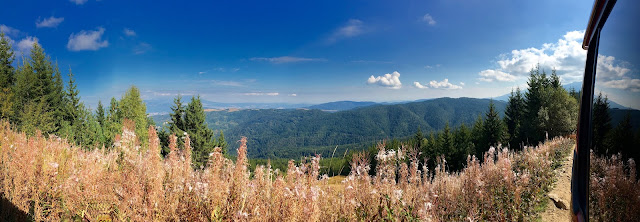 |
| Admiring the views to the north from the 4x4 |
There were four
others (a German, an American, a Pole and a Peruvian), plus our local driver,
who made the two hour journey to Rila. At the halfway stage, I woke up when we
stopped for fuel and snacks, and thereafter enjoyed the views towards the
mountains on the right, before branching off the highway and onto a winding
road that took us up towards the lakes. It wasn’t long before we were
surrounded by forest, dappled sunlight occasionally streaming into the car
where there were gaps between the trees, and I was breathing in the
invigoratingly cold, fresh mountain air. Our driver, who spoke little English,
explained that he thought the chairlift that would take us to the start of the
hiking trails would be extremely busy (as it was a Sunday in late September?),
and that we would be better off paying an acquaintance of his to take us
further up in a 4x4. The price would be the equivalent of the chairlift fee,
and we would get to the ski lodge below the lakes much quicker. We held a short
confab and agreed to go with the 4x4 option, as it had its merits, and it
nothing else, it might be a bit of fun.
At the top of
the tarmac road, we swapped over into a black jeep and straight away, were
careering up an impossibly steep gravel slope, jolting and jerking all over the
place. Newtonian laws didn’t seem to apply to this hardy vehicle, and we were
quite plainly defying the physics of our inevitable loss of traction and rapid
plummet back down this rocky incline. My body wasn’t providing me with much of
a shock absorption system, and it was soon uncomfortable. After three or four
minutes of this, we reached the first real bend in the road, and the driver
prepared for a short burst of speed to give us some momentum heading into the
next climb. Instead, the car lost power and crawled to a halt, steam delicately
wafting into the air from the engine. Cursing in Bulgarian, the driver flung
himself out of the vehicle and ripped open the bonnet to unleash clouds of acrid
black smoke, before screaming at us to get out of the car. The five of us
looked around at each other, all thinking the same thing but none daring to
speak. We did, after all, pity this driver whose jeep was now smouldering in a
forested wilderness, but how did we ask a man with no English the really important question: were we going to be stuck here with him, the fire crew and the mountain rescue service,
or were we going to make it up to the lakes?
That question
was answered when a gleaming red 4x4 rose heroically up the same stretch of
track that had defeated our first car. My memory of this event has action movie
music blaring over the top of the birds cheeping and the rustle of the breeze
through the mountain trees. The second driver, a silent but friendly man with a
weathered face, large, rough hands and deep brown skin from too many years
spent outside in the elements, beckoned us to join his car. This ride was
similarly bumpy but we made it up the trail without hindrance, and this car
survived without catching fire like its predecessor.
 |
| The second 4x4 with its trusty Bulgarian driver, beneath the empty chairlift that was allegedly too busy for us to take |
 |
| Looking down onto the ski lodge after the first short climb |
A large wooden
sign announced that we were entering the national park, and here our driver
evicted us and said, in pidgin English, that because it was the edge of the
park he could go no further and we would have to proceed the final stretch to
the ski lodge on foot. Above us, the chairlift stretched on towards its upper
station, empty chair after empty chair humming past. We set off, mildly
irritated that our original driver hadn’t given us the full truth when he said
that we would be dropped off at the top of the chairlift, and further annoyed
that his concern that we would have waited upwards of an hour to board the lift
was completely unfounded, with very few people actually using it today. Not
wanting to waste more time, we pressed on and in around ten minutes, were at
the ski lodge.
The short
ascent beneath the chairlift to the treeline had made it clear that the three
girls were walking much slower than I would like, so we agreed to split, and I
took the lead with the German guy and the others followed some distance back.
We had no map aside from a photo I had taken of the park’s informational sign,
which detailed trails and approximate walking times. The ski lodge was
fruitless when we enquired about a map there. Nevertheless, it was easy to see
where to go as there were plenty of locals who had also thought it a good idea
to venture into the mountains for the day.
 |
| The rugged landscapes of the Rila Mountains had a distinctly Caledonian feel |
 |
| The bottom-most lake, the Lower Lake (Долното езеро) |
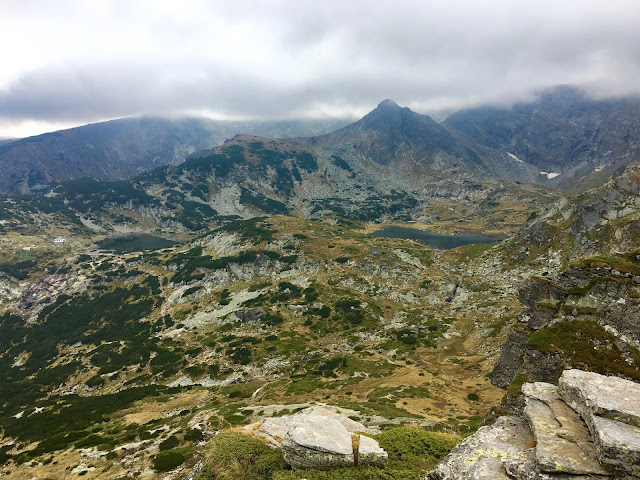 |
| The second and fourth lowest of the seven lakes, the Fish Lake (Рибното езеро) and the Twin (Близнака) sit within a patchwork landscape of dotted greens and greys |
At 2,100
metres, this was half as high as I climbed when I reached the top of New
Mexico’s highest – and the USA’s 99th highest – mountain, Wheeler
Peak, three years before. However, it was a comparable landscape of barren
heather and stunted, hardy green bushes clinging to outcrops of rock above
precipitous drops. I could have been in the Scottish Highlands. Far below and
to the left, the first couple of lakes passed by, and above us were five other
major lakes; our goal was to get to as many as possible.
Along the way,
we covered all manner of topics including general small talk, but then history
and politics came up, and we spent a great deal of time discussing linguistics,
a subject that has interested me increasingly since I started reading about it
a couple of years ago. There is little point in going into too much detail
here, but a great number of etymologies and comparative histories of English
and German were shared along the way.
 |
| The Kidney (Бъбрека) |
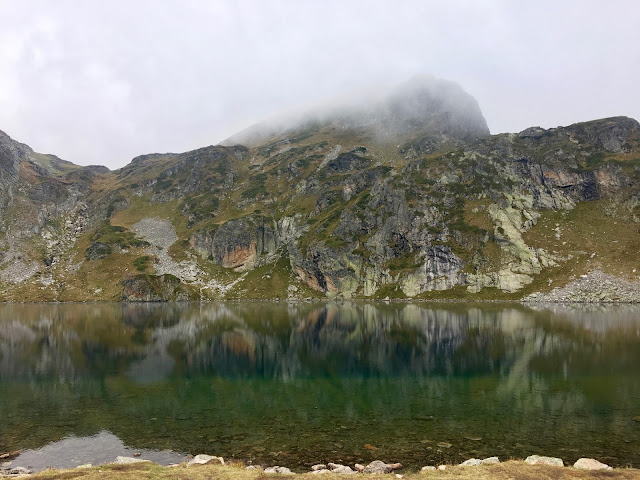 |
| Even with the sunlight hidden by cloud, the Kidney produced magnificent reflections |
Having bypassed
the lower lakes in favour of taking the higher route to begin with, the first
lake we reached was the third highest, the Kidney (Бъбрека), which is, funnily enough,
shaped like a kidney. The northern shore was gentle but on the southern, the
craggy cliff plummeted into the lake to meet a carbon copy of itself on the
glassy water. Thick cloud shrouded the high peaks above, limiting the view not
far beyond the lake. Pushing on, the path soon became a scramble up a loose
scree slope, still a marked trail but an uneven one littered with small stones
waiting to cause a twisted ankle or bounce perilously down the slope to injure
some unsuspecting hiker further below. Before getting completely smothered by
the cloud, I turned back, and finally saw an epic view very similar to the one
that had caught my attention seven years before, as a series of small plateaus
stepped down the mountain from left to right, each topped with a blue-grey
lake. The picture on Wikipedia had been taken from higher up and had one more
lake in it, but the cloud meant I would not see that same view. Despite that,
it was a supreme spectacle and a delightful place to have come.
 |
| A small stream trickled down the mountainside to feed into the Kidney |
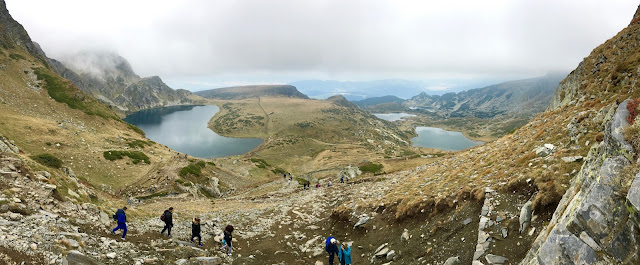 |
| Looking back downhill revealed four of the five lower lakes |
 |
| Evaporation from the surface of the Eye (Окото) contributing to new clouds |
 |
| A ridge covered in loose rocks separated the highest lake, on the right, from the second highest, on the left |
 |
| The Tear (Сълзата), the highest of the seven Rila lakes, was shrouded in cloud |
The second
highest lake, the Eye (Окото), was
off to the right as we made a final push to the highest, the Tear (Сълзата), at 2,535 metres. Here, we were truly engulfed
by the cloud, and it was rather surreal sitting by the water eating lunch, the
air a degree or two above freezing, and a dense grey blanket obscuring
everything above us. The lake itself is a small tarn surrounded by steep
slopes, so even the path we had taken up and into this little basin was
rendered invisible. The voices of other walkers a few metres away carried
through the mist but no humans or other life forms could be seen at all.
After enduring
the cold and dipping our hands into the icy water, we began the descent. It had
taken two hours to reach this height, and we had around the same time to return
to the 4x4, assuming this one hadn’t burnt out during our absence. The initial
route was much trickier than it had been going up; it always seems easier to
lose one’s footing when attempting to go downhill. A little over half an hour
later, and still uninjured, we had made it back past the first three to the
shores of the largest of the second, the Twin (Близнака). Its name was made apparent by the fact that this lake tapered
in the middle where a slope of land bit into it, and then bulged out again
beyond, forming a misshapen figure of eight. This one was even more mirror-like
than the Kidney had been, and was also full of tiny minnows that sat
contentedly in the waters before darting about at the slightest ripple or
disturbance, often appearing to spontaneously group together to isolate one of
their number and cannibalise it. It seemed odd, but there can’t be much food in
such an inaccessible pool of water so perhaps preying on their own kind was
commonplace for these fish.
 |
| The shape of the Kidney became very apparent when seen from above |
 |
| Three of the lower lakes. The lowest is out of sight behind small hills |
 |
| The Twin (Близнака) |
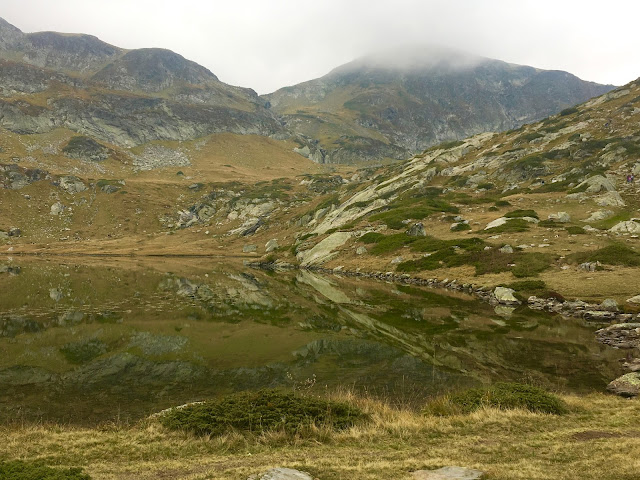 |
| The surface of the Twin was well camouflaged among the rocks and heather |
The next lake, the Trefoil (Трилистника), passed by
on the left, and the path then touched along the shore of Fish Lake (Рибното езеро), a chalet on its northern edge finally
showing that we were nearing civilisation again. This path was much less
popular than the higher one had been, but it was worth it for the different,
much more vegetated, landscape and the closer views of the four lower lakes.
The final one, the Lower Lake (Долното езеро) was still a long way below and off to the right. A final tentative
scramble down a rocky slope and then a long march through swampy ground
preceded one last climb of a few metres uphill to reach the ski lodge again.
 |
| The Trefoil (Трилистника) |
 |
| This boulder-strewn slope separated the Twin from Fish Lake |
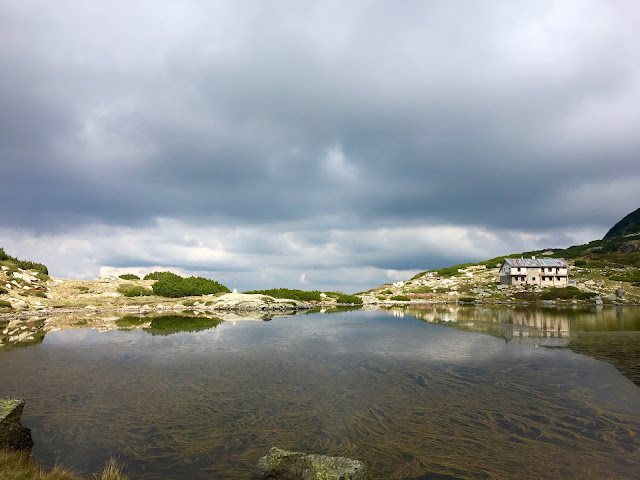 |
| Fish Lake (Рибното езеро), Rila's second lowest |
 |
| A last look up at the mountains beside Fish Lake before descending to the lower slopes |
 |
| The Lower Lake (Долното езеро) lay beside the bottom end of the trail, the line of brown that cuts between the low trees on the left, towards the chalet on the ridge |
By sheer
coincidence, two of the three girls got there at the same time as I did, and
told us that the third, the American, had hurt her knee and had last been seen
hobbling along some way back. As it was now almost exactly the rendezvous time,
I suggested that a couple of us go ahead to inform the driver to ensure he knew
what was happening and would wait for us, and a couple remain to wait for the
American. Naturally, my taking charge of the situation meant I drew the short
straw and was tasked with waiting for the walking wounded, although in the end
she didn’t take too much longer, and we were delayed in leaving by only around
twenty minutes.
I am pleased to
say that this time, no vehicles caught fire, but the drive downhill was much
more of a white knuckle ride than the drive up. The gravel slope was every bit
as steep as it had been before, but we now faced the added psychological
torment of facing downwards. We could thus see the sharp drop that we would
inevitably slide down towards, to end up in a fiery inferno of twisted metal
and tree branches. Each minor loss of traction, each rumble of wheelspin, and
each rough lurch to one side or the other produced short shrieks from the
girls, and we were all much relieved once we emerged onto the delightfully
smooth paved road at the base station of the chairlift around fifteen minutes
later.
 |
| The chairlift was still empty during the final descent |
Knackered from
the day’s hiking, the entire group crashed out in the back of our original car
after we had switched out of the 4x4, and none of us woke up again until we
were well into Sofia, grateful at not having been held up by any more vehicular
ailments. One of the hostel’s staff led me to my room, situated in another
building five minutes away, and there I was lodged with a motley assortment of
a Bulgarian jobseeker from another city, a 50-something Scottish cyclist on a
tour of the Balkans, an Australian backpacker, a young German couple away for
an extended weekend, and a middle aged East Asian man whom nobody saw much of,
but who was often heard shouting about noise during the night.
Before settling
in for the night, I decided to take a couple of hours to wander around Sofia. I
was to see more of the city during the day tomorrow, but it was not yet late
and I wanted to find something to eat (burek
again, which has become quite a staple food for me in this region), and I
had a nice bit of exploring in pleasant temperatures to get a small flavour of
the city prior to seeing it properly in the morning. An added bonus was the
opportunity to practise reading all the signs in the Cyrillic script. I had
taught myself to read the letters a year or so before, and had come across them
in Serbia and Bosnia alongside the Latin alphabet, but Macedonia yesterday and
Bulgaria today were the first two places I had visited that use only Cyrillic
(though Latin signs and adverts in English, thanks to globalisation, were
frequent too). Most confusing was the italic version of the Cyrillic script, as
used on many road signs. I had mastered the ‘false friends’ among the alphabet’s
letters (namely С = S, Н = N, В = V, and Р =R), but now had to contend with
italic г = g, and worst of all, the
close similarity between м and т, which are m and t respectively. Thankfully, I got used to it in the three days I spent in Bulgaria. I was
glad not to have to move for a couple of nights, after several days of constant
travelling, and full of anticipation for taking in the sights and sounds of
Sofia in a few hours’ time.
 |
| Rila: desolate ground, rugged mountains and stunning reflections |


























No comments:
Post a Comment